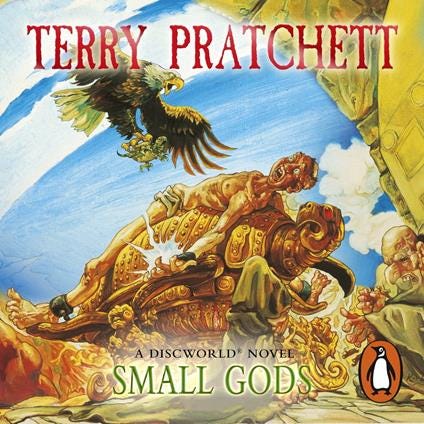Small Gods (Discworld #13)
I haven’t been my usual contrarian self when reviewing the Discworld novels. I’ve enjoyed the popular books, liked most of the others, and only really disliked one (Pyramids). My opinions have represented those of the average Discworld reader…until now.
Okay, that’s being a bit dramatic. I just don’t like Small Gods quite as much as most people seem to. Small Gods is often held up as a good standalone novel for those who want to dip their toe into Discworld without committing to a big series. I’ve seen it in many a top-five list, and it’s even some people’s favorite Discworld novel. I merely thought it was quite good.
His philosophy was a mixture of three famous schools -- the Cynics, the Stoics and the Epicureans -- and summed up all three of them in his famous phrase, 'You can't trust any bugger further than you can throw him, and there's nothing you can do about it, so let's have a drink.
The premise is absolutely rock solid. What’s not to like about the idea of Terry Pratchett—one of the world’s greatest satirists—taking on religion? It’s a wonder it took him until the thirteenth book to reach that low-hanging satirical fruit. Small Gods also contains the funniest god committed to paper. However, I found the overall story to be a little meandering and unfocused which made it more of a chore to read than it needed to be.
The Ephebians believed that every man should have the vote (provided that he wasn't poor, foreign, nor disqualified by reason of being mad, frivolous, or a woman). Every five years someone was elected to be Tyrant, provided he could prove that he was honest, intelligent, sensible, and trustworthy. Immediately after he was elected, of course, it was obvious to everyone that he was a criminal madman and totally out of touch with the view of the ordinary philosopher in the street looking for a towel. And then five years later they elected another one just like him, and really it was amazing how intelligent people kept on making the same mistakes.
Small Gods is about the god Om who is rapidly losing believers. Gods are like modern-day influencers: they get their power from their follower count. Losing subscribers means losing power, except instead of declining ad revenue and a lack of sponsors, gods get stuck in progressively weaker bodies. That’s how Om ended up in the body of a tortoise. Not an image that inspires faith even if there is good eating on a tortoise.
There’s no point in believing in things that exist.
The only person who understands Om in his current form is the helpless Brutha, a slightly dim individual blessed with picture-perfect memory. As someone with a terrible memory that is getting worse with each rapidly passing year, I am more envious of Brutha than I care to admit. Unfortunately for Brutha, Vorbis, an Inquisitor,1 sees the potential of Brutha’s memory and uses it for nefarious means on a diplomatic mission.
I think, if you want thousands, you have to fight for one.
Small Gods is excellent when it focuses on the Small God himself. Om’s angry rants at people who can’t understand him are hilarious. The mental image of a tortoise furiously spouting curses at people who can’t hear him will never not be funny. And yes, as an atheist, I do have a huge soft spot for any story that mocks religion. Pratchett doesn’t go in too hard, but he lands a couple of playful jabs.
Slave is an Ephebian word. In Om we have no word for slave,' said Vorbis.
'So I understand,' said the Tyrant. 'I imagine that fish have no word for water.
However, the bigger story involving Omnia and Ephebe never grabbed me. Vorbis is basically just Lord Vetinari, but slightly more evil and less cunning. We never get enough insight into the nations to care all that much about what is happening and why. The lack of a compelling story slightly diminished my enjoyment, but the philosophers of Ephebe still offer plenty of entertainment. Small Gods is one of those books that’s about the journey, not the destination.
Probably the last man who knew how it worked had been tortured to death years before. Or as soon as it was installed. Killing the creator was a traditional method of patent protection.
Pratchett doesn’t do a great job of making me care about Omnia and Ephebe. Pratchett injected so much life and personality into Ankh-Morpork that I can imagine living there. He hasn’t replicated that here. Omnia and Ephebe feel like vague notions of places right now. I can’t picture them in my mind. Maybe that will change in future novels.
Yes, an Inquisitor is exactly as nasty as you imagine from a title like that.



